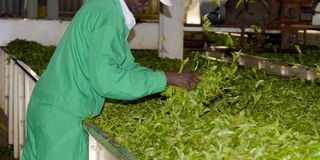Tea factories switch to greener energy to cut costs

A worker spreading tea leaves for processing at Chelal Tea Factory.
At Chelal Tea Factory in Kericho, farmhands load plunks of firewood into a truck which hauls the wood into a burning chamber where they are used to process fresh tea leaves.
Above the factory’s roofs, chimneys puff clouds of smoke into the sky as workers feed more wood into the boiler.
The firewood is used to wither fresh tea leaves before they are oxidised and crushed.
The withering process which is the major energy consumer in the factory, reduces the moisture content in the fresh green leaves by 30 per cent making them limp and soft enough for rolling.
However, the use of firewood is being phased out as tea factories shift to cleaner and more affordable renewable energy sources.
Makomboki Tea factory in Murang’a was the first of the 66 tea factories managed by the Kenya Tea Development Authority (KTDA) to do away with firewood in 2015 when they switched to briquettes made of macadamia, cashew and rice husks.
HIGH COST OF PRODUCTION
George Kimathi, the Chelal Tea Factory unit manager, says they spend more than Sh30 million every year on firewood, which when combined with electricity bills pushes up their cost of production.
“We use firewood to generate steam which is used in tea processing. In a month we consume 1,600 cubic metres of wood – a mature tree is about four cubic metres – which translates to Sh3.4 million per month,” explains Kimathi.
Since electricity is too expensive, tea factories use vast quantities of firewood – accounting for nearly 90 per cent of energy – to process tea leaves, piling massive pressure on the country’s fading forests.
A study conducted by Green Africa Foundation estimate that Kenya loses 5.6 million trees daily, despite relentless campaigns on environmental conservation, with about 25 per cent of annual deforestation caused by commercial logging.
The Chelal Tea Factory manager noted that every kilo of tea leaves produced takes up at least Sh10 worth of energy, a cost which is then passed on to consumers.
“We acquired a 260-acre piece of land where we have planted eucalyptus trees.
“But once in a while we source firewood from local farmers. This cushions us a little from incurring heavy costs,” said Mr Kimathi.
SUSTAINABILITY
Plantation of eucalyptus, a fast-maturing tree, however faces strong opposition from environmentalists who say it contributes to desertification by sucking a lot of water from the ground and lowering water tables.
Water-stressed countries like Kenya must therefore opt for environmentally friendlier indigenous trees, scientists say.
Philip Odhiambo, an energy and climate change expert at World Wide Fund for Nature (WWF-Kenya) points out that while tea factories rely on firewood for thermal heating, wood fuel might not be sustainable, especially for small-scale factories.
“Harnessing the sun’s energy is a better alterative compared to using wood fuel whose environmental impacts are proving costly,” he noted.
Solar technology is what Chelal Tea Factory is switching to for tea processing.
The factory has partnered with Absolicon, a Swedish solar energy solutions company, to pilot solar trough collectors which will generate the heat needed for the boilers.
Unlike the flat surfaced solar panels which produce electricity, solar collectors are parabolic in shape which enables concrete sun’s rays to be used in thermal heating explained Perminder Hunjan, a solar energy expert at Tealand Engineering.
Mr Hunjan whose company specialises in providing engineering solution to tea factories urged the government to tighten the regulations on solar technology products so as to build people’s faith on the products.
KTDA is also constructing a mini power station to generate electricity for its factories in Kericho County as part of its move to renewable energy.



